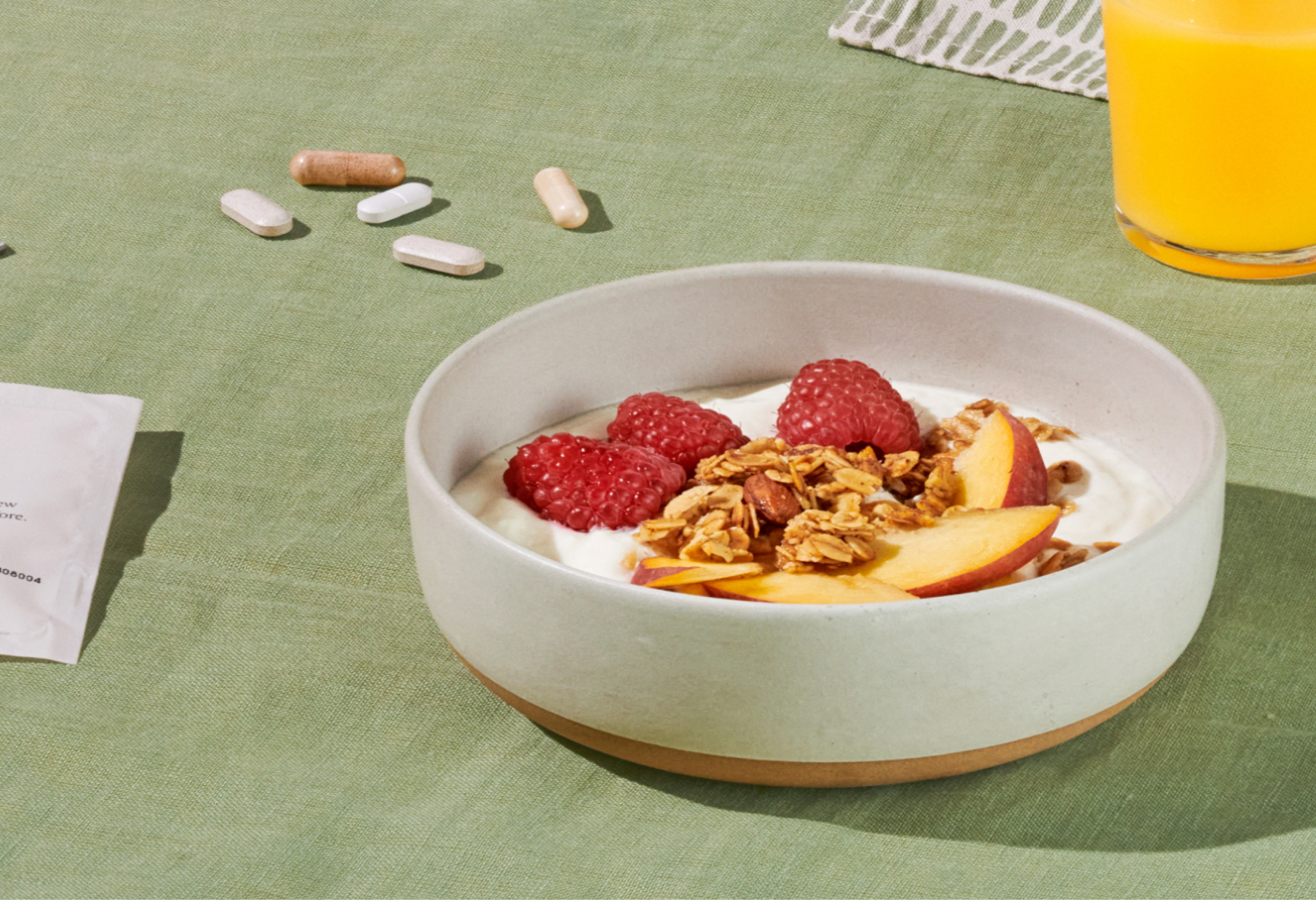science
Can You Take Prebiotics and Probiotics Together?
On This Page

Answer to the question: can you take prebiotics and probiotics together? Yes, you can combine prebiotic and probiotic supplements for health benefits.
As you may know, prebiotics and probiotics are commonly associated and both have health benefits. They both come in supplement form and can support the gut microbiome. In this article, we’ll explore whether prebiotics and probiotics can be taken together.
Before we talk about combining prebiotics and probiotics, let’s first define each of them.
What are prebiotics and probiotics?
Prebiotics and probiotics are not the same. Although sometimes confused, the difference is simple: whilet probiotics are microbes, prebiotics are food for microbes. Essentially, prebiotics feed probiotics.
But aren’t microbes a bad thing? Not always!
Your gut contains a variety of microbes (or microorganisms) that support the health of your digestive tract and likely many other areas of your body. This collection of bacteria, yeasts, and parasites in your gut is called the microbiome.
Normally, there is a balance between the “good” microbes and “bad” microbes in the gut. But when we experience a shift in this good-bad balance, whether due to a change of diet, illness, or antibiotics, pre and probiotics can help return the gut microbiome to its former healthy state.
Probiotics are beneficial bacteria or yeasts. One source of probiotics is fermented foods, but taking a probiotic supplement can provide their health benefits in a higher potent dose.
Okay, so we now understand what probiotic supplements are. But how about prebiotics?
Unlike probiotics, prebiotics are not live organisms. Prebiotic fibers are fibers found in certain types of carbohydrate foods like artichokes and oats. Prebiotics are not broken down and absorbed by the digestive tract, but are instead fermented by your gut microbes. Hence, as we said before: prebiotics feed probiotics!
Prebiotics can also be found in supplement form as inulin, fructo-oligosaccharides (FOS), and beta-glucans.
Prebiotics and probiotics have a variety of potential health benefits.
Health benefits of prebiotics
We know that prebiotics can provide food for the good microbes living in your gut. We also know that the gut microbiome is essential for helping your body break down food and make certain nutrients.
Studies on the microbiome continue to reveal just how important the microbes in our gut are for almost every area of our health. The benefits of a healthy microbiome include immune and digestive support.
Since prebiotic fibers support the microbiome, they have been extensively researched for their impact on gut health.
The benefit of prebiotics, in part, is that they feed our body’s beneficial microbes. They may also help support regular bowel movements. While it’s likely that many different types of prebiotics can be beneficial, this review paper looked at the benefits from inulin specifically.
Health benefits of probiotics
Feeding you good gut bugs is great! But what if your microbiome needs a bit of a boost? Probiotic supplements can help fill in this gap by providing beneficial microbes that may have a variety of health benefits.
Probiotics and gut Health
Much of the research on probiotic supplements is focused on gut health.
Studies suggest that when we take antibiotics, probiotics can provide balance to the gut microbiome. They may also support a healthy gut while traveling.
We know that kids can have delicate digestive systems, and researchers found that probiotics can help support the gut health of infants and children.
Like prebiotics, probiotics have also been found to be supportive of regular bowel movements.
Probiotics and immune Health
As we’ve learned from research, the gut microbiome is important for immune system support.
We want the immune system to respond properly to maintain optimal health, and studies suggest that probiotics may help support a healthy immune response.
The most commonly researched bacteria for immune and digestive health include:
- Lactobacillus rhamnosus: GG
- Lactobacillus acidophilus: LA-5
- Bifidobacterium lactis: BB-12
There is also a beneficial yeast called Saccharomyces boulardii that has been researched for its gut health benefits.
Can you combine prebiotics and probiotics?
While they definitely have benefits when taken alone, the question remains: can you take prebiotics and probiotics together?
The answer is a resounding YES! You can combine prebiotics and probiotics.
Let’s review the details.
Is it safe to combine?
Prebiotics and probiotics are both safe and should be sourced from a reputable brand that is third party tested.
Prebiotic and probiotic supplements can be safely combined as long as you are not sensitive to either of them (or their ingredients) on their own.
Health benefits of combining prebiotics and probiotics
Since prebiotics feed probiotics, taking prebiotics and probiotics together can have a synergistic, or what we might call a symbiotic effect. This means that they have benefits when used alone, but that those isolated benefits expand when used in combination.
Combining prebiotics and probiotics may help support gut health. This review article found that taking prebiotics and probiotics together supported healthy bowel movements.
The symbiotic effect of prebiotics and probiotics may also extend to the immune system. A systematic review of the data suggests that taking prebiotics with probiotics may help support a healthy balance of microbes throughout the body.
Potential health risks and side effects of combining prebiotics and probiotics
Both prebiotics and probiotics could potentially cause a slight increase in bloating within the first few days of use, or if we take too much of either at once. The potential symptoms should resolve within a few days once the gut microbiome adjusts.
However, there is no evidence to suggest that combining prebiotics and probiotics can cause more side effects or pose any specific health concerns.
How to take prebiotics and probiotics together
If you want to combine prebiotics and probiotics, there are one of two ways:
One way is to purchase a probiotic supplement that already includes a prebiotic in it. One of the most common is inulin. However, some people may be sensitive to inulin and can experience gastrointestinal symptoms at a high dose. Inulin is also not appropriate for someone on the low FODMAP diet. Make sure you read the labels carefully when choosing a prebiotic and probiotic complex.
The other option is to take prebiotics and probiotics as separate supplements. This gives you the highest level of control over the amount of each. You can test your tolerance of each by themselves and can increase or decrease either supplement in isolation.
Best time to take prebiotics and probiotics
If you are taking prebiotics and probiotics as separate supplements, it’s easiest to take them at the same time.
Prebiotic and probiotics foods
Prebiotic fibers are found in some carbohydrate-containing foods like fruits, vegetables, and grains.
Prebiotic foods include:
- Apples
- Artichokes
- Oats
- Onions
- Garlic
Certain fermented foods are sources of probiotics. Some yogurts have live strains of good bacteria added to the milk. These can include strains of Lactobacillus or Bifidobacteria. Food manufactures may also add probiotics to foods like smoothies, granola bars, and nutritional drinks.
Probiotic foods include:
- Kimchi
- Kombucha
- Sauerkraut
- Yogurt
While both prebiotics and probiotics are available in the diet, taking them as a dietary supplement can ensure that you get a large enough dose to have the researched health benefits.
Should I take a prebiotic and probiotic supplement?
Your healthcare provider can help you decide if you should take probiotics and probiotics together. If you’ve been taking a probiotic supplement for a while but don’t think it’s working, you may consider adding a prebiotic. Conversely, adding a probiotic to a prebiotic that you are already taking could give you the benefits you are looking for.
For prebiotics, consider taking our Prebiotic Plus. It is clinically studied and contains ingredients that help support healthy microbes!
Our Probiotic Blend is a combination of widely researched strains of good bacteria.
Combine them together and give your gut a boost!
Final takeaways
Overall, you can take prebiotics and probiotics together. In fact, they may actually work together and have a symbiotic effect. This means that probiotics and prebiotics can support each other and can support the digestive and immune system.



